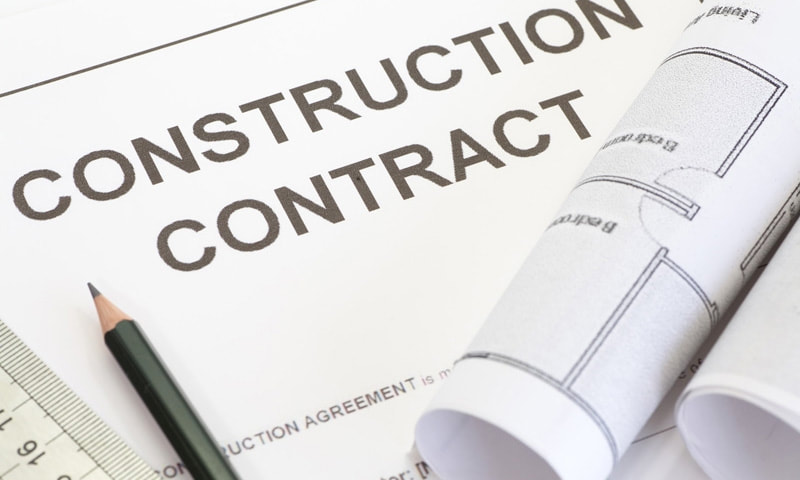How Should You Pay A General Contractor, Fixed Price versus Cost Plus Contract?-- BYHYU 1216/13/2018 A couple of weeks ago we talked about the bidding process, mainly as it pertains to owner builders getting bids from subcontractors (Episode 119). This week I’ll give you a quick overview of the different types of contract agreements you might decide on if you’re going to hire a general contractor to build your house. We'll briefly discuss fixed price contracts and cost plus contracts. Choosing which type of builder's contract to use is almost as important as choosing which general contractor to hire. FIXED PRICE With a fixed price contract, you get several general contractors to competitively bid on your entire project. Price is a big factor in deciding who gets the job, but it’s not the only factor. Just like choosing subcontractors through a bidding process, you’ll want to choose a general contractor who you trust to do the best job at the lowest price. The builder who can do the best quality work for a competitive price. That means you might not choose the absolute lowest bidder. What typically happens with a fixed price contract process is that you give your favorite builders your plans and specifications, then each of those builders will give those plans and specs to their subcontractors. Ok, Pop Quiz, what are the specifications? Specifications was one of our pro terms in Episode 119 called Understanding the Bidding Process. Specifications, or specs, describe what materials will be used and how those materials should be installed. Specs are like the written description of how to build your house. The more detailed your specifications, the more accurate you bids will be. Okay, back to fixed price contracts... the builders give your plans and specs to the subs and the subcontractors come up with a cost estimate for their part of the job. Then the general contractor assembles all those bids from plumbing, electrical, painting, etc into to one bid that will give you the overall cost for your project. This may take several weeks. It’s to the builders advantage to come up with the lowest price in hopes that you will choose him, so make sure you understand what’s specifics are in the bids before you decide on a particular builder. Make sure those bids don’t include subpar materials and installation methods. For example, know what type of windows, cabinets, insulation and HVAC equipment the builder is planning on installing. And when you compare builders’ bids, make sure you are comparing apples to apples. The most significant advantage of a fixed price model is that it allows the homeowner to know in advance what the house will cost. You will be aware of the total cost before the project even begins. So for example, let’s say your house is estimated to cost $300,000. In a fixed price contract, if the builder bids $300,000 and the house ends up costing more, the builder must pay for the overage; if it costs less, he gets the additional profit. The main disadvantage of the fixed price model is that it typically limits the number of changes that can occur during the construction phase. Although some changes can be made, you will probably pay dearly for them in change order fees, price re-negotiations and/or changes to the project schedule. Another disadvantage: since the builder will be focused on not going over that agreed upon fixed price, quality and creativity may suffer. For some builders, the quality of the work is often less important than their profit. Moving on to the next type of contract... COST PLUS Cost plus contracts, also called time and materials contracts, are often used on jobs with a lot of unknowns. Very little information is necessary to use this model. With a cost plus contract, the builder simply gives a rough estimate of what he thinks it will cost to build the house. You’ll need a house plan, but you won’t need to have every detail complete and you don’t really need detailed specifications. A cost plus contract is for homeowners who are less interested in saving money and more interested in hiring a builder because of his reputation and his availability. Assuming the builder is competent, experienced and honest, the homeowner will have a good (but not exact) idea of how much he or she will pay for the new home. But If the builder does not estimate the costs accurately, the homeowner could pay tens of thousands of dollars more than he anticipated, or even more. That’s the main disadvantage of a cost plus contract — since the cost estimate is just a rough estimate, the homeowner is taking a huge chance that the house will go way over budget. The builder has no incentive to be accurate in his estimate because it’s the homeowner who will have to pay the overages. In general, the cost-plus model is supposed to be a very open process where the homeowner is allowed to review the contractors bills and other documentation of his costs. This would include invoices for materials and subcontractors, as well as work hours and billing rates for labor. Invoices are often not provided unless requested by the homeowner. If you decide on a cost plus contract, you should take advantage of ability to review the builder's invoices just to make sure the contractor is keeping good records and billing you accurately. Yes, you should trust the builder, but you should also verify. That’s one of the golden rules of construction, Trust but Verify. It just makes sense. If you decide on a cost plus model, you’ll have to decide between cost plus a percentage or cost plus a fixed fee. In the cost plus a percentage arrangement, the contractor bills the client for his direct costs for labor, materials, and subs, plus a percentage to cover his overhead and profit. Markups might range anywhere from 10% to 25%. With cost plus a percentage, there is little incentive for the contractor to save money on the project because the more money your project costs, the more money he will make. In addition, the contractor has no good reason to complete the job quickly– because the longer he takes to build your house, the more he’ll be spending on labor and overhead and the larger his profit will be. The other option is a cost plus a fixed fee. With this model, the contractor bills the homeowner for his direct costs, plus he’ll get an agreed upon fixed fee to cover his overhead and profit. That fee will not increase if the house goes over budget. With a cost plus a fixed fee model, the contractor is motivated to complete the job quickly because the fee will be the same whether he builds your house in 8 months or if he builds it in 18 months. The more quickly he can finish your house, the faster he can move on to the next job to make more money. For example, with cost plus a fixed fee, if the homeowner signs a contract to pay the builder $30,000 plus the cost of construction, whether the house costs $300,000 or $500,000, the homeowner will still only pay $30,000 for the builder’s overhead and profit. The advantage of a cost plus fixed fee contract is obvious. If the cost of the house exceeds the estimate, the builder isn’t making a bigger fee so he has some incentive to save you money, or at least not spend a lot of extra money. In summary, if you’re going to hire a general contractor to build your house, you’ll have to decide between a fixed price contract and a cost plus contract. A fixed price arrangement is better for homeowners who want to know how much their house will cost before they begin construction and for those who have lots of detail about the house they’re going to build and don’t mind having limitations on the number of changes they can make during construction. A cost plus arrangement is better for homeowners who are less concerned with budget and more motivated by the builders reputation. They are comfortable with more unknowns about the construction of their house. They want their house to be built by a specific builder and are willing to take the risk of their house going well over the initial estimate. So that was a quick overview of the fixed price and cost plus contracts. I hope you learned as much as I did. Come back next time for the next edition of Build Your House Yourself University --BYHYU. Please remember that the purpose of this podcast/post is simply to educate and inform. It is not a substitute for professional advice. The information is based the only on the opinions, research and experiences of my guests and myself. That information might be incomplete and it is subject to change. In addition, building codes and requirements vary from region to region, so it may not apply to your project. Always consult a professional about specific recommendations for your home. -- Happy Housebuilding!!!
0 Comments
Your comment will be posted after it is approved.
Leave a Reply. |


 RSS Feed
RSS Feed